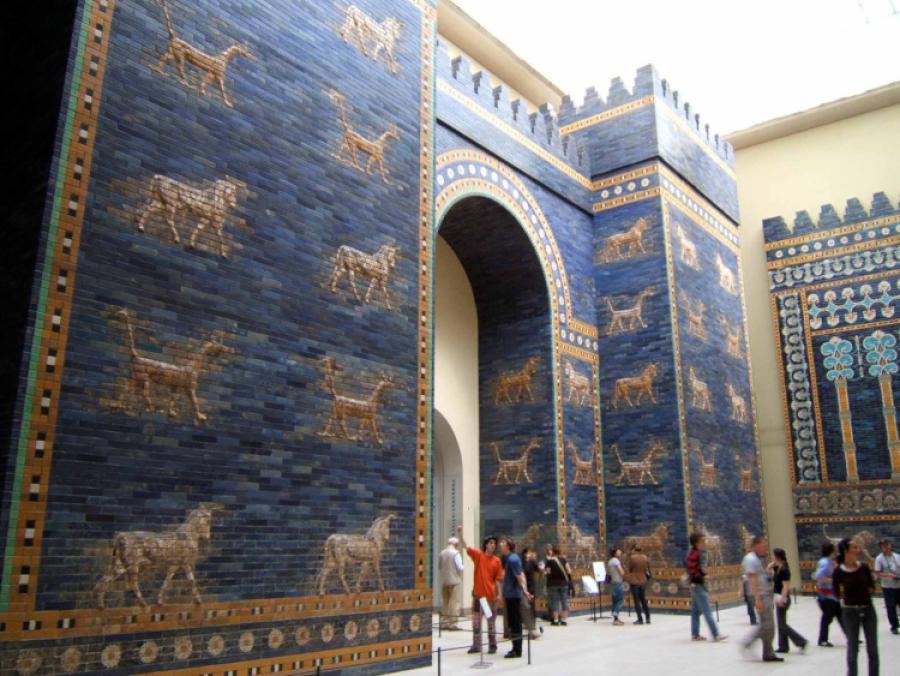Leadership Lessons from Daniel
Image

Reconstruction of Nebuchadnezzar's Ishtar Gate (Pergamon Museum in Berlin)
Of all the great characters found on the pages of Holy Scripture, none—outside, of course, of our Lord Jesus Christ—serves as a greater example to us than the prophet Daniel.
Transported to Babylon in the first wave of the captivity of Judah in 605 B.C., Daniel’s life was upended at an early age. This could have been an excuse for him to abandon any ties to his people and his God. He was taken to a strange land, given a new name and offered all the worldly comforts available in the king’s court (Dan. 1:7-10).
There he remained for more than 70 years, enduring the launches of two world empires and serving under seven world leaders.
But Daniel took the opportunity—not to blend in, but to stand out. He believed that God had not forsaken him, but rather promoted him. They had taken the boy out of Jerusalem, but they could not take Jerusalem out of the boy (e.g., Dan. 9:21).
And the Lord rewarded Daniel for His faithfulness. Interestingly, the man who received the final prophetic revelation of the New Testament was the Apostle John—“the disciple whom Jesus loved” (John 21:20). Daniel is often regarded as the counterpart to John within the Hebrew Bible, as the one who received the highest understanding of the prophetic future in the days before the coming of Christ. He, too, was a “man greatly beloved” (Dan. 10:11).
The foundation of Daniel’s life and ministry was his absolute determination and resolve to serve the God of Israel and remain true to Him, even in the pagan land of Babylon (Dan. 1:8). He displayed moral integrity in the most difficult of situations. We also gain further insights into Daniel’s character, such as his compassionate heart for others—including the pagan “wise men of Babylon” (Dan. 2:24), and even the great King Nebuchadnezzar (Dan. 4:19). This king had pronounced a death sentence on Daniel’s three friends (Dan. 3:19-20). Yet Daniel remained Nebuchadnezzar’s loyal confidant and counselor—and, apparently, finally won his heart to the Lord (Dan. 4:34-37).
Upon that moral foundation, Daniel built a life characterized by excellent wisdom and skill. He had certainly received the natural ability to do so (Dan. 1:4), and he dedicated his life to using his gifts for the greatest effect (Dan. 1:17-21).
Daniel developed these attributes with God’s help, and they became the key to his promotion by Nebuchadnezzar (Dan. 2:46-49) and his service for decades in both the Babylonian and Medo-Persian empires (Dan. 6:1, 2, 28). From his position as “chief administrator over all the wise men of Babylon” (Dan. 2:48), Daniel influenced generations of Eastern leaders, pointing them toward godly wisdom based on Biblical revelation (see Matt. 2:1).
Daniel’s wisdom was also evident in:
- His counsel – The dignity with which he spoke (Dan. 2:14)
- His concern – The depth of insight by which he prayed (Dan. 2:20-23)
- His calmness – The decorum by which he conducted his duties (Dan. 4:8-9)
- His care – The display of excellence that marked his ministry (Dan. 5:11-16; 6:3-5)
- His clarity – The degree of understanding by which he prophesied (Dan. 12:3, 10)
Ultimately, Daniel’s natural intellectual gifts were magnified in his life by his right use of the prophetic revelation that he received supernaturally (Dan. 2:47). This resulted in a life that manifested excellence—carefully maintained to the finest detail (Dan. 5:12, 14; 6:3).
We can all wish that we had the opportunity to witness Daniel’s stellar career in action. But I did have the awesome privilege of studying Daniel under Dr. John C. Whitcomb in seminary, and that experience forever shaped my relation to this great prophet and his astounding book. Dr. Whitcomb summarized the power of his example like this: “In attempting to master the message, let’s not miss the man.”
In his classic commentary on the book of Daniel, titled The Most High God, which was published by The Friends of Israel Gospel Ministry in 1982, the great Bible teacher Dr. Renald Showers made the following striking statement:
In light of the present situation, no other book has a more timely message for man than the biblical book of Daniel. (“Introduction,” para. 7)
Don’t miss Daniel—the man or his book. He truly offers teaching for our time.
Photo: Rictor Norton, CC BY. Scripture quotes, New King James Version, © 1982 Thomas Nelson, all rights reserved.
Paul Scharf 2019 Bio
Paul J. Scharf (M.A., M.Div., Faith Baptist Theological Seminary) is a church ministries representative for The Friends of Israel Gospel Ministry, serving in the midwest. He also assists Whitcomb Ministries and writes for “Answers” Magazine and Regular Baptist Press. For more information on his ministry, visit foi.org/scharf or email [email protected].
- 767 views


Discussion